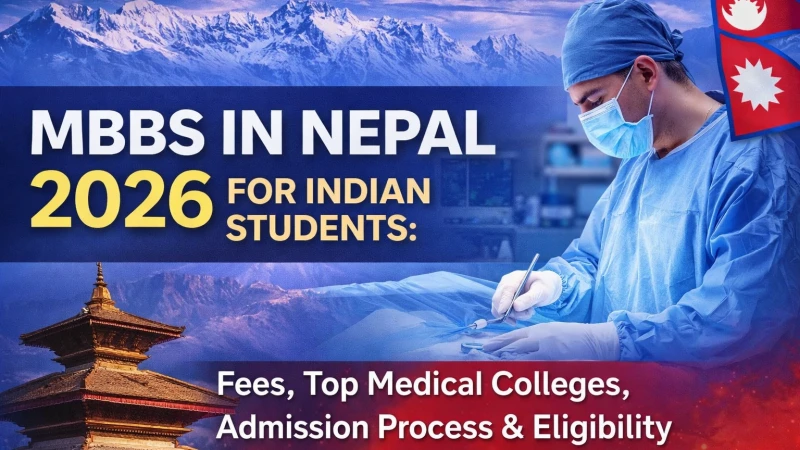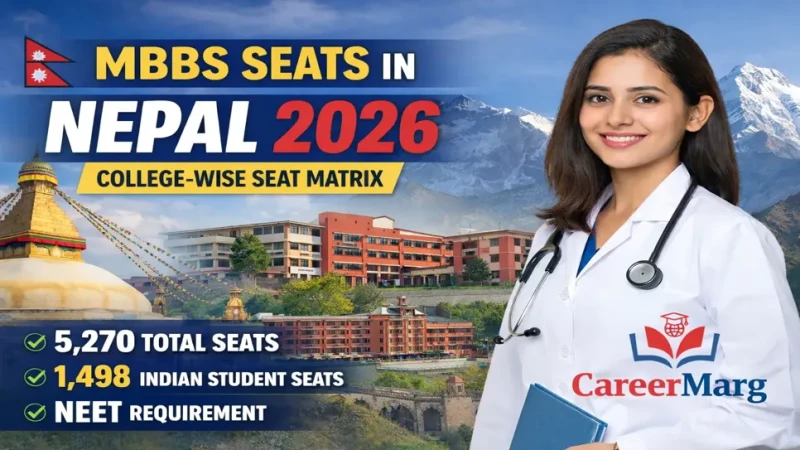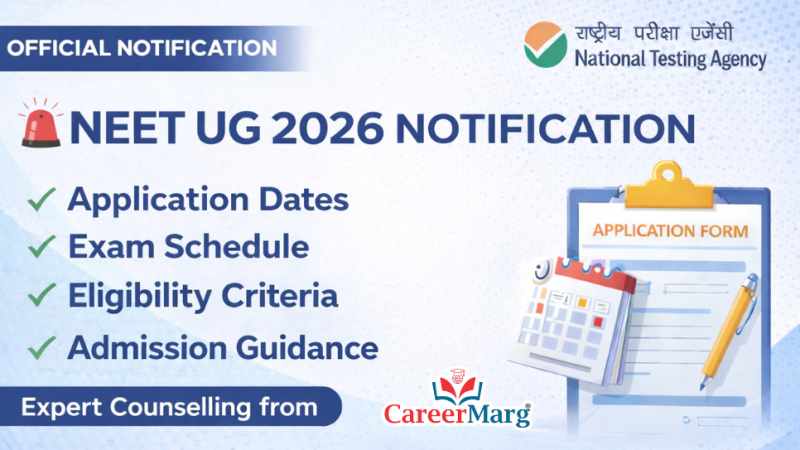India’s No. 1 Online Admission Portal Apply Now
India’s No. 1 Online Admission Portal Apply Now
NEET 2020 is the national level entrance for admissions to MBBS and BDS courses as well as Ayush, veterinary, AIIMS MBBS, JIPMER MBBS and other medical courses in the country. Held across 154 cities in the country, Last year saw 14,10,754 students appear for the exam and the number is expected to rise more for the 2020 examination. The number of seats has also increased with the introduction of the EWS quota which is supernumerary in nature.
Dr. Harsh Vardhan, Ministry of Health and Welfare, in a recent interview on October 4, announced NEET 2020 to be the single entrance exam for medical UG courses in India. National Testing Agency (NTA) has announced the important dates of NEET 2020 through an official notification on August 21, 2019. NTA will conduct the National Eligibility Entrance Test (NEET) 2020 on May 3 in pen and paper-based mode. Registration of NEET 2020 and filling up of application form will start from December 2, 2019, and end on December 31.
NEET 2020 application correction is likely to be available from the second week of January for candidates who wish to correct mistakes in their forms. Admit Card of NEET 2020 will be available for download on March 27, 2020. Candidates who have appeared for the exam can check the answer key of NEET 2020 in May while the result will be announced on June 4, 2020. Counselling will start thereafter separately for the All India quota for 15% of the government medical seats in the country plus seats of deemed universities and central universities and state-wise counselling for 85% of the government seats and all private seats of the state.
|
Particulars |
Details |
|
Name of the Examination |
National Eligibility-cum-Entrance Test (NEET-UG) |
|
Conducting body |
National Testing Agency (NTA) |
|
Examination level |
National |
|
Examination category |
Undergraduate |
|
NEET Scope |
· Admission to MBBS and BDS programs in India · Admission to all the AYUSH courses available in the country. · Admissions to veterinary and other undergraduate medical courses in the country. · To pursue MBBS and BDS abroad · Admission to AIIMS MBBS and JIPMER MBBS |
|
Seat Intake |
75893 (MBBS seats) in 529 colleges (as per MCI) 26693 (BDS seats) in 313 colleges (as per DCI) |
|
Number of Applicants |
15,19,375 (in 2019) |
|
Number of Appeared Candidates |
14,10,754 (in 2019) |
Since NEET is the single largest undergraduate medical entrance exam, candidates must keep track of the important dates of NEET 2020. This will aid them in avoiding missing any important deadline like application, correction, admit card download dates and more. The NEET 2020 important dates are given below in a table.
|
Events |
Dates |
|
Notification |
August 21, 2019 |
|
Application form release date |
December 2, 2019 |
|
Last date for registration |
December 31, 2019 |
|
Last date to pay the application fee |
December 31, 2019 |
|
NEET 2020 correction window dates |
The second week of January 2020 |
|
Release of Admit Card |
March 27, 2020 |
|
NEET 2020 exam date |
May 3, 2020 (2.00 PM to 5.00 PM) |
|
Display of recorded responses |
May last week, 2020* |
|
Release of provisional answer keys |
May last week, 2020* |
|
Release of final official Answer Key |
June 4, 2020* |
|
Declaration of NEET 2020 results |
June 4, 2020 |
|
Counselling for 15% AIQ/Deemed/Central Universities/ESIC and AFMC |
|
|
Registration - Round 1 |
June second week, 2020 |
|
Result of Round 1 |
July first week, 2020 |
|
Registration - Round 2 |
July second week, 2020 |
|
Result of Round 2 |
July second week, 2020 |
To appear for the entrance test, candidates must meet the prescribed eligibility criteria. NEET eligibility criteria will detail the nationality, age limit of candidates as well as the qualifying exam studied, subjects and pass percentage for the same. The NEET 2020 eligibility criteria are listed below.
|
Criteria |
Details |
|
Nationality |
Indian Nationals, Non-Resident Indians (NRIs), Overseas Citizen of India (OCI), Persons with Indian Origin (PIO) Foreign Nationals |
|
Age Limit |
Candidates must at least be 17 years of age by December 31, 2020. There is no upper age limit for NEET 2020 |
|
Qualifying Exam and subjects studied |
Candidates must have qualified Class 12 or equivalent examination with Physics, Chemistry, Biology/Bio-technology. Candidates appearing for their class 12 or equivalent are also eligible to appear for the exam. |
|
Minimum Required Marks |
Applicants must have scored minimum marks as mentioned below in each subject and in aggregate. Unreserved Candidates - 50% Physically Handicapped - 45% SC/ST/OBC NCL – 40% |
|
Additional Biology and Open School students |
Candidates with Biology as an additional subject in Class 12 are also eligible. Students who have completed Class 11 and Class 12 from open school are also eligible. |
|
Number of attempts |
There is no limit on the number of attempts. |
NTA will release the NEET 2020 application form online on December 2, 2019. The process to apply for NEET is completely online. The NEET application process involves five steps in all which have been detailed below. However, first candidates must keep some documents and details ready such that they complete filling their application of NEET 2020 successfully at one go.
|
Documents/Details |
Specifications |
Size and Format |
|
Photograph |
· Postcard size picture with a white background · Imp: Name of the candidate and date must be printed below the photograph |
Size - 10 Kb to 100 Kb Format - JPG |
|
Signature |
· Signature of the candidate in black ink on white background |
Size - 3 Kb to 20 Kb Format - JPG |
|
Other details |
· Mobile Number · Email ID · Class 10 details · Class 12 details · Identity Number - Aadhaar Card number/ Passport number/ Ration Card number/ bank account/ any other valid Govt. identity number |
|
NTA has specified five easy steps to fill the online NEET application form. They are as follows
1. NEET 2020 Registration: Candidates must enter their name, email Id, mobile number, gender etc to register and generate their provisional application number and login credentials.
2. Log in to fill NEET application form 2020: Next candidates must use the given NEET 2020 login ID and password to fill the personal, academic and communication details
3. Upload photograph, signature and other documents: the details and specifications of the photograph and signature are given above.
4. Pay the application fee of NEET: Candidates must pay the prescribed fee, the details of which are given below. Payment mode is online through net banking, debit/credit cards etc or through cash deposit (e-challan) to be paid at State Bank of India branches only.
|
Categories |
Application Fees |
|
General/OBC-NCL Candidates |
Rs. 1,400 |
|
SC/ST/PH/Transgender Candidates |
Rs. 750 |
5. Print confirmation page: after the payment is made and details submitted, candidates must download the confirmation page and save the same.
Guidelines for NEET 2020 aspirants by NTA after filling application form:
While filling the NEET 2020 application form, candidates must choose at least four exam cities in the order of their preference. NEET will be conducted in 154 cities in around 2546 exam centres in 64000 exam rooms with 128000 invigilators (as per 2019 statistics). Candidates may note that they will be allotted the centre as per their first preference if there are enough vacancies or enough candidates for the same. In case of insufficient candidates for a centre, it may be cancelled and the next preferred centre may be allotted. It is also to be noted that the exam centre of NEET 2020 cannot be changed or modified after submitting the application form. Hence candidates must plan the list of NEET exam centres carefully and enter them accordingly. Few exam centres of NEET 2020 has been listed below in the table.
NEET 2020 Test Cities with Codes
| Exam City | Exam City Code |
| Vijayawada | 1205 |
| Visakhapatnam | 1206 |
| Chandigarh/Mohali/Panchkula | 1601 |
| Bhilai/Durg/Bhilai Nagar | 1701 |
| Bilaspur | 1702 |
| Delhi/New Delhi | 2001 |
| Ahmedabad | 2201 |
| Bangalore | 2702 |
| Trivandrum | 2811 |
| Mumbai | 3110 |
| Nagpur | 3111 |
| Jaipur | 3903 |
| Chennai | 4101 |
| Coimbatore | 4102 |
| Varanasi | 4411 |
| Lucknow | 4408 |
NTA will release the NEET 2020 admit card on March 27, 2020. Candidates can download the admit card of NEET by entering their application number and date of birth. After downloading they must check all details mentioned therein. It is mandatory to carry a valid photo ID proof along with the NEET 2020 admit card which is also the identity document for the candidates. Candidates must also keep in mind the exam day guidelines mentioned on the NEET admit card. It is prudent to keep the admit card safe till the admission process concludes.
NTA has specified a certain dress code that must be adhered to by candidates appearing for NEET 2020. The guidelines have been in place to ensure that no malpractices, irregularities, cheating etc occur in the exam halls. Some of the guidelines for NEET dress code are
The list of items barred in NEET 2020 are
Preparation is the crucial part and the starting step towards achieving the goal of cracking NEET 2020. Candidates in the process of preparation must first know the syllabus, exam pattern to have a good shot at the exam and then cement that with proper and ample practice.
NTA has a prescribed syllabus comprising of topics from Physics, Chemistry and Biology of class 11 and 12 levels. The main topics with weight that matter in an exam like NEET are given below. However, students must understand that they should ideally study the entire NEET syllabus that is prescribed and leave no stone unturned in their endeavour to crack NEET 2020.
|
Physics with weightage |
Chemistry with weightage |
Biology with weightage |
|
Work, energy and power -6% |
Thermodynamics - 9% |
Diversity in Living World - 11% |
|
Motion of System Of Particles and Rigid Body - 4% |
Equilibrium - 6% |
Biology and Human Welfare - 5% |
|
Properties of bulk matter - 14% |
Solutions - 5% |
Structural Organisation in Animals and Plants - 10% |
|
Thermodynamics - 9% |
Alcohols, Phenols and Ethers - 8% |
Plant Physiology - 8% |
|
Electrostatics - 9% |
Electrochemistry - 4% |
Human Physiology - 12% |
|
Current Electricity - 8% |
Chemistry in Everyday Life - 4% |
Reproduction - 11% |
|
Optics - 10% |
d and f Block Elements - 4% |
Genetics and Evolution - 12% |
|
Electronic devices 14% |
Coordination compounds - 4% |
Biology and Human Welfare - 5% |
|
Magnetic Effects of Current and Magnetism, Electromagnetic Waves - 5% each |
Chemical Bonding and molecular structure - 5% |
Biotechnology and Its Applications, Cell Structure and Function - 7% each |
|
Dual Nature of Matter and Radiation - 6% |
Chemical kinetics, Classification of elements and periodicity in properties, Hydrogen, Aldehydes, Ketones and Carboxylic Acids, Polymers, Biomolecules - 3% each |
Ecology and environment - 13% |
The exam pattern of NEET 2020 will indicate exam details like type of questions, mode of exam, duration, language, marking scheme etc. Candidates can perform better if they what to expect in the exam hall while appearing for the exam. Also, preparation should be moulded according to the NEET exam pattern such that students can feel comfortable with the exam. The NEET 2020 exam pattern is explained below
|
Particulars |
Details |
|
Mode of Exam |
Pen and Paper/ Offline mode |
|
Duration |
3 hours |
|
Total Number of Questions |
180 Questions |
|
Subjects and Sections |
Physics – 45 Questions Chemistry – 45 Questions Biology – 90 Questions |
|
Marking Scheme |
+4 marks for each correct answer; -1 mark for each wrong answer; 0 mark for each unanswered question |
|
Maximum Marks |
720 marks |
|
NEET Score Calculation |
Score = Total number of correct answers x 4 – Total number of incorrect answers x 1 |
NTA will conduct the NEET exam in 2 national and 8 regional languages. The languages of the NEET 2020 UG exam is mentioned in the table below.
|
S. No. |
Language |
S. No. |
Language |
|
1. |
Hindi |
7. |
Telugu |
|
2. |
English |
8. |
Oriya |
|
3. |
Assamese |
9. |
Kannada |
|
4. |
Marathi |
10. |
Bengali |
|
5. |
Gujarati |
11. |
Urdu |
|
6. |
Tamil |
-- |
|
While understanding and building conceptual knowledge is a pre-requisite, equally essential is to strengthen the concepts and use them to analyse and answer the questions. Practice only makes a person more perfect and aids in clearing doubts as strengthening the knowhow. NEET 2020 Sample papers are the ideal tool to cement the concepts learnt and NEET previous year question papers given an idea of how the actual paper will be like. Students should start with practising the questions at the end of each topic and chapter and then move on to full-length exam papers.
The minimum marks required to qualify NEET 2020 is the qualifying cutoff. NTA has specified the cutoff for each category wherein students who score equal to or above this cutoff of NEET 2020 will be eligible for admissions. The NEET cutoff for admission is the minimum rank/marks at which the last seat was allotted to the eligible applicants. Candidates may note that NEET cutoff 2020 will vary for each category, institute and for MBBS/BDS as well. The admission cutoffs are useful for aspirants to understand the marks they need to score for admission at the institute of their choice.
|
Category |
Minimum Qualifying Percentile |
Qualifying Scores |
Number of candidates qualified |
|
Unreserved (UR) |
50th Percentile |
701-134 |
7,04,335 |
|
Unreserved Physically Handicapped (UR-PH) |
45th Percentile |
133-120 |
266 |
|
Scheduled Caste (SC) |
40th Percentile |
133-107 |
20,009 |
|
Scheduled Tribe (ST) |
40th Percentile |
133-107 |
8,455 |
|
Other Backward Classes (OBC) |
40th Percentile |
133-107 |
63,789 |
|
SC-PH |
40th Percentile |
133-107 |
32 |
|
ST-PH |
40th Percentile |
133-107 |
14 |
|
OBC-PH |
40th Percentile |
133-107 |
142 |
|
Total |
7,97,042 |
||
NTA will declare the result of NEET 2020 on June 4. Candidates who have appeared for the exam can check and download their result after logging in by entering their roll number and date of birth. The NEET 2020 result will be the basis for admissions into the All India Quota as well as the state-wise available MBBS and BDS seats. The result mentions the details of the candidates along with the marks obtained in total and subject wise, All India Rank and the qualifying cutoff for the various categories. Candidates must download their NEET score card cum result for future reference during counselling.
Government guidelines prescribe a certain reservation based on the caste and category of students. NEET 2020 reservation criteria describe the percentage of reservation entitled to each category for the seat allotment in the counselling process. Candidates can refer to the details below.
|
Category |
Reservation percentage |
|
OBC (Other Backward Classes) |
27% |
|
Scheduled Caste (SC) |
15% |
|
Scheduled Tribe (ST) |
7.5% |
|
Physically Handicapped (PH) |
5% |
The Counselling for NEET 2020 is of two types – All India and State wise. The All India NEET 2020 counselling will be held for 15% of the seats in all government colleges of the country as well as the prescribed quota under the Central Universities and 100% of the seats in deemed universities. State-wise NEET counselling 2020 will be held for the 85% of the remaining government seats as well as 100% of the seats in private colleges. All admissions are based on the NEET 2020 scores and ranks though state admissions may consider their merit ranks based on the NEET 2020 marks obtained by the students. It is to be noted that state counselling will be independent of the All India NEET 2020 counselling conducted by MCI. Also, students must meet the eligibility prescribed by the state such as domicile and study period in the state before applying.
The Counselling of NEET 2020 will generally have two rounds both for All India and State. Thereafter the mop-up round will be for vacant seats in deemed and central universities while any vacant government seats in the AIQ will fall back to the respective states. The state counselling, however, will have a mop-up round where admissions to the vacant seats will be considered.
No Comments Found

MBBS in Nepal is a popular choice for Indian students seeking affordable and NMC-approved medical education abroad. The total cost of MBBS in Nepal ranges between ₹45–75 lakhs depending on the college. Admission requires NEET qualification, and the course duration is....

Studying MBBS abroad has become one of the most popular options for Indian students who want to pursue a medical career but face intense competition and high tuition fees in India. Every year, thousands of NEET-qualified students choose MBBS abroad....

Explore the MBBS in Nepal 2026 seat matrix with complete college-wise seat distribution, foreign quota details for Indian students, eligibility criteria, fees, and admission process. Get accurate and updated guidance from CareerMarg for securing your medical seat in Nepal.Complete College-Wise....

NEET UG 2026: Important Dates (Official)EventDateApplication Start Date08 February 2026Last Date to Apply08 March 2026 (up to 9:00 PM)Last Date for Fee Payment08 March 2026 (up to 11:50 PM)Correction Window10 March – 12 March 2026NEET UG 2026 Exam Date03 May 2026Exam Timing02:00 PM – 05:00 PM (IST....

Why Choose Manipal College of Medical Sciences Nepal?NMC approved medical college for Indian studentsAffiliated with Kathmandu University750+ bed Manipal Teaching Hospital for clinical exposureEnglish medium MBBS programStrong FMGE / NExT preparation supportHigh patient inflow and hands-on trainingMBBS Course DetailsCourseDurationMBBS5.5 Years....